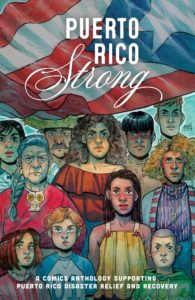
It is a scary time to receive a package in Austin, especially when you don’t remember ordering anything. I had pre-ordered the comics anthology Puerto Rico Strong months ago and when I received it today it took me a few seconds to register what it was. I had bought it immediately after seeing it pop up on Amazon (though now I wish I had waited to purchase it from an independent bookseller), eager to support anything that donated its proceeds to disaster relief and recovery. For me, that was enough to justify the purchase. Now, with the beautiful collection in my hands, I am blown away by not just the cause around the book, but also the work inside of it.
Puerto Rico Strong, edited by Marco Lopez, Desiree Rodriguez, Hazel Newlevant, Derek Ruiz, and Neil Schwartz, is an overwhelming collection of written and graphic talent. It combines voices, stories and visions from throughout Puerto Rico and the diaspora. In his introduction, Ruiz writes that he was faced with this tough question: «How is being a weirdly awkward nerd going to help PR?» Lopez’s answer was to bring together their fellow nerds and create this anthology. As Newlevant explains, «The comics in Puerto Rico Strong weave together a prismatic tapestry of Puerto Rican identities and experiences. They range from intimate family traditions to uncovered histories; the direness of the present moment to the luminous possible futures we can strive for.»
With over 40 comics, this anthology puts the diversity of Puerto Rican and Latinx comic art on full display. Every few pages the art drastically changes, though there is a common thread of urgency and reflection that connects each story. The selections that deal directly with Hurricanes Irma and María and their aftermath each provide different visions or experiences of loss and recovery. Amparo Ortíz and Eliana Falcón-Dvorsky’s «What Remains in the Dark» features hauntingly dark panels of a family waiting for a blackout to end, while Aldo Álvarez, Sofia Dávila and Micah Myers’s «Resilience by Lamplight» looks at the importance of community for nourishing oneself in such terrible times. Both «Hope,» by Neil Schwartz and Ramón Sierra, and «La Casita of American Heroes,» by Anthony Otero, Charles Ugas, Dennis Calero, and Micha Myers, follow Puerto Ricans traveling back to the island to check on their families, afraid of what might be awaiting them when they arrive. Tomo Beland’s black-and-white «Thanks for Nothing» delves into the disgusting and harrowing responses by Trump, including the infamous paper towel toss. However, even in the solemn images of Ronnie Garcia’s «Here,» there is still a sense of hope that Puerto Rico and its people will recover together.
Though it could have filled multiple collections with post-hurricane stories, the collection interweaves other moments and movements from throughout Puerto Rican history. There are a number of comics highlighting indigenous histories, mythologies, and presents, including Vita Ayala and Jaime Jones’s «Areytos,» Sabrina Cintron’s «Gods of Borikén,» Alejandro Rosado and Shariff Musallam’s «A Taíno’s Tale,» and Joamette Gil’s «Taino Online.» While many of the comics touch on the current financial crisis, Rosa Colón’s «A Broken P.R.O.M.E.S.A.» lays out the factors behind and consequences of the establishment of the Junta Fiscal. Ally Shwed offers two comics on histories of the medical abuse of Puerto Rican woman: «La Operación,» about coerced sterilization, and «The Puerto Rican Birth Control Trials,» about the use of Puerto Rican women as non-consenting test subjects. These stories connect the post-hurricane horrors to a history of colonialism that helps explain the condition of Puerto Rico before the storms and into recovery.
Due to my own interests, two comics stuck out to me for their visions of the future. In Tristan J. Tarwater and Cynthia Santos’s colorful «Pasitos Grandes,» a teacher leads his class on a virtual reality trip around Puerto Rico’s history, including a mid-21st-century time in which Puerto Ricans took control of their recovery and discovered life-changing advancements in renewable energy. This leads to the formation of the first Puerto Rican colony of the moon and the creation of the Atabey Space Station. In Gene Selassie, Orlando Baez, Juan Fernandez and Micah Myers’s cyberpunk «Todavía tengo Puerto Rico en mi corazón,» a duo risks their lives to uncover a conspiracy involving corporate colonialism and robot police brutality. These stories encapsulate the messages that appear throughout the anthology: the situation is dire, but there is always something we can do to try to make it better.
